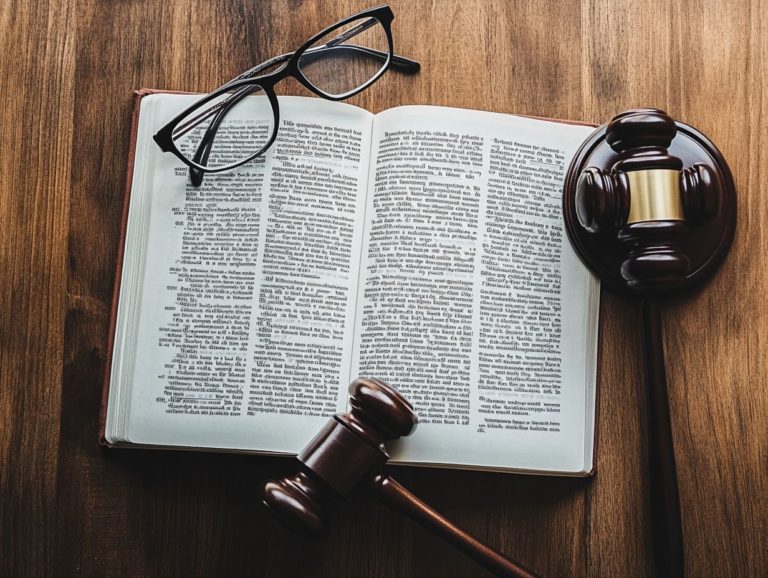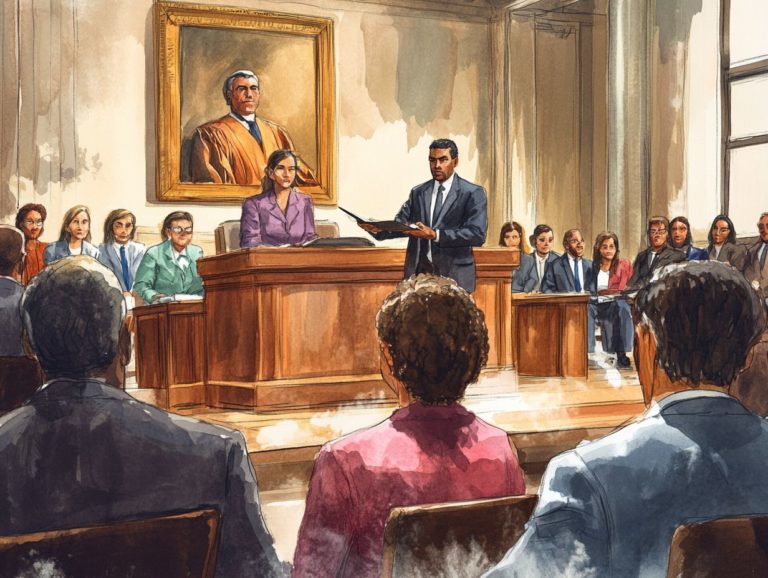Understanding Your Rights During Interrogation
Interrogation can feel like an overwhelming experience, often clouded by confusion and anxiety. This article explains what interrogation is and your rights during the process. It highlights the important Miranda protections.
You ll learn about the implications of remaining silent. We will also discuss the choices you have when interacting with law enforcement.
By the end of this article, you will feel more confident navigating this complex situation.
Contents
- Key Takeaways:
- The Basics of Interrogation
- Your Rights During Interrogation
- Remaining Silent During Interrogation
- Cooperating with Interrogators
- Legal Consequences of Interrogation
- Seeking Legal Counsel
- Frequently Asked Questions
- What are my rights during an interrogation?
- Do I have to answer any questions during an interrogation?
- When should I exercise my right to remain silent during an interrogation?
- What happens if I do not have an attorney present during an interrogation?
- Can my silence be used against me during an interrogation?
- What should I do if I feel like my rights are being violated during an interrogation?
Key Takeaways:

Know your rights: You have the right to remain silent and to have an attorney present during interrogation. Use them to protect yourself.
Think before you speak: Cooperating with interrogators may seem like the best option, but it can have legal consequences. Consider the benefits and risks before providing information.
Seek legal counsel: Having a lawyer present during interrogation is crucial. They can advise you on your rights, protect you from self-incrimination, and ensure a fair process.
The Basics of Interrogation
Grasping the fundamentals of interrogation is essential for anyone engaged in the criminal justice system. It involves a range of techniques law enforcement employs to extract information from suspects during questioning.
Understanding these methods is vital, especially since they have evolved greatly since the landmark Miranda v. Arizona case. Keeping the interrogation process fair is very important, as it directly influences the admissibility of evidence and the rights of individuals in custody.
What is Interrogation?
Interrogation is the process where law enforcement officials question individuals suspected of involvement in criminal activities. This intricate procedure often employs a variety of techniques aimed at eliciting truthful information or confessions from suspects.
To encourage cooperation, law enforcement may utilize strategies like rapport-building, psychological persuasion, and even deception. It’s crucial for you to understand that reasonable suspicion plays a vital role in determining whether an interrogation can occur, as it lays the foundation for lawful engagement.
You also have specific legal protections during this process, including the right to remain silent and the right to legal counsel. These safeguards protect you from coercive tactics and ensure that you are treated fairly under the law.
Your Rights During Interrogation
Your rights during an interrogation are firmly protected by constitutional safeguards, including the Miranda Rights. These rights inform you of your ability to remain silent and to seek legal representation, thus helping you avoid self-incrimination. Understanding these protections is essential, as they enable you to grasp your legal standing during police questioning, particularly in custodial scenarios.
Miranda Rights and Other Protections
The Miranda warning serves as a crucial safeguard in the legal landscape, informing you of your rights, including the Fifth Amendment’s protection against self-incrimination. This warning also highlights your Sixth Amendment right to an attorney, ensuring that you are fully aware of your right to legal counsel during interrogations.
Understanding these rights is vital, as the consequences for you as a suspect can be significant; if you aren t properly informed, any statements you make might not hold water in court. The notion of waiving your rights is particularly important in this context. You can choose to voluntarily relinquish these rights, but this waiver must be made knowingly and intelligently.
The legal system emphasizes the significance of these protections to uphold fairness and justice, reinforcing the idea that no one should be coerced into self-incrimination.
Remaining Silent During Interrogation

Using your right to remain silent can change everything. It s a powerful tool to protect yourself against self-incrimination, and your decision to invoke it can profoundly influence the trajectory of any criminal charges you may face.
Benefits and Risks of Silence
Choosing to remain silent during a police interrogation can lead to a maze of legal consequences, presenting you with a mix of advantages and disadvantages that demand your careful consideration.
On one hand, exercising your right to remain silent acts as a crucial shield against incriminating yourself. It allows you to sidestep the risk of unintentionally divulging damaging information that could sway the outcome of your case. Legal experts often advocate for this strategy to protect your rights, especially when navigating uncertain waters.
However, it s essential to remember that your silence may be interpreted by investigators as a sign of guilt or evasiveness. This could distort their perception of your intentions.
In essence, the implications of choosing silence are a double-edged sword, offering both protective benefits and inherent risks that could profoundly impact your legal journey.
Cooperating with Interrogators
Cooperating with interrogators requires a delicate balance. While sharing information may seem advantageous, it is crucial to understand the importance of legal representation and the potential implications of your statements, particularly in the realm of criminal defense.
When and How to Provide Information
When you decide to provide information, it s essential to consult with legal counsel and familiarize yourself with police protocols. This ensures that any voluntary statements you make serve your best interests.
Navigating the complexities of law enforcement interactions requires a sharp awareness of both timing and context. The impact of a voluntary statement can dramatically shape the course of an investigation.
Legal advice can clarify potential consequences, protecting your rights along the way. Understanding the environment in which you share information can greatly influence how your statements are perceived. A well-timed communication can foster cooperative interactions, while hasty disclosures may lead to misunderstandings.
Being informed about legal considerations helps you make wise decisions, ultimately aiding in your navigation of the intricacies of the justice system.
Legal Consequences of Interrogation
The legal consequences of interrogation can profoundly influence the outcome of criminal charges. The way an interrogation unfolds plays a critical role in determining the admissibility of evidence and the risk of self-incrimination.
Understanding this dynamic is critical for your future!
How Interrogation Can Affect Your Case

The manner in which interrogation is conducted can profoundly impact your case, shaping everything from the strength of the evidence against you to the quality of your criminal defense.
A poorly executed interrogation may lead to false confessions or unreliable testimonies, influencing a judge or jury s perception in ways you can’t afford.
Tendencies to misinterpret information, like confirmation bias, can distort how law enforcement interprets your responses during questioning. This introduces an additional layer of complexity to the legal landscape, as these biases can create skewed narratives that overshadow the actual facts.
Legal representation becomes essential in this context. Skilled attorneys are trained to navigate these intricacies, ensuring your rights are protected. They can challenge the admissibility of evidence obtained through coercive or misleading tactics, significantly shaping the eventual outcome of your case.
Seeking Legal Counsel
Seeking legal counsel is essential during any police interrogation. Having an attorney by your side not only safeguards your rights but also ensures that you are thoroughly represented against potential criminal charges.
Don’t wait contact a lawyer today to protect your rights!
Importance of Having a Lawyer Present
Having a lawyer present during police questioning is absolutely crucial for you. It opens the door to valuable legal help that can protect your rights and significantly shape the course of the interrogation.
In this pivotal role, your attorney ensures that the questioning aligns with legal standards. They act as a protective barrier against any pressure tactics that law enforcement might employ. Your attorney is well-equipped to guide you on when to respond, when to stay silent, and when certain questions might tread on your constitutional rights.
The presence of your attorney helps uphold the integrity of the process, meticulously documenting any potential misconduct or violations that could affect your case. By safeguarding the legal proceedings, your attorney is an essential advocate who balances the scales of justice in your favor.
Frequently Asked Questions
What are my rights during an interrogation?
As a suspect or witness, you have the right to remain silent and not answer any questions that may incriminate you. You also have the right to have an attorney present during the interrogation and to stop the interrogation at any time.
Do I have to answer any questions during an interrogation?

No, you do not have to answer any questions during an interrogation. You have the right to remain silent and not incriminate yourself. It’s crucial to exercise this right and wait for your attorney to be present before answering any questions.
When should I exercise my right to remain silent during an interrogation?
You should exercise your right to remain silent from the beginning of the interrogation. Clearly state that you are invoking your right to remain silent and will not answer any questions without your attorney present.
What happens if I do not have an attorney present during an interrogation?
If you do not have an attorney present during an interrogation, you have the right to request one. The interrogation should be stopped until your attorney arrives. It’s important not to answer any questions until your attorney is present.
Can my silence be used against me during an interrogation?
No, your silence cannot be used against you during an interrogation. It is your right to remain silent and not incriminate yourself. The prosecution cannot use your silence as evidence of guilt.
What should I do if I feel like my rights are being violated during an interrogation?
If you feel like your rights are being violated during an interrogation, clearly state that you are invoking your right to remain silent and will not answer any questions without your attorney present. You can also request to stop the interrogation until your attorney arrives.
If you ever find yourself in a situation where your rights might be at stake, don’t hesitate to reach out to a qualified attorney immediately.






